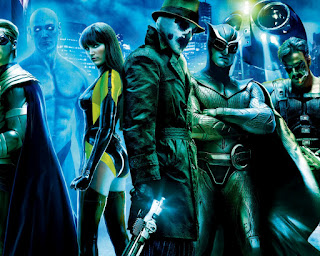Superheroes — Do Heroes Exist?
"We can do so much more. We can save this world... with the right leadership." — Adrian Veidt, "Watchmen"
Today I continue my look at the mythology of superheroes with "Watchmen," a piece that asks the question — do heroes really exist? It follows that up with the thought that, if heroes existed, they wouldn't be like what we like to think.
"Watchmen" is a grim, dystopian film that features a very specific and caustic view of the world and the nature of heroes. Alan Moore, who created the graphic novel, was an atheistic anarchist, and as such didn't have a lot of regard for government, conventional society, or those that believe a hero can save us. "Watchmen," in large part, is a commentary on that belief and a commentary against society — both in the 1980s when it was made and now.
What's ironic is that the work has become revered for setting the standard in the very genre it sought to questions. In 2005, Time listed it as one of the 100 greatest novels ever written. Novels. Critic Lev Grossman declared it was “a heat-pounding, heartbreaking read and a watershed in the evolution of a young medium.” In 2008, Entertainment Weekly listed it as No. 13 on the list of the 50 greatest novels of the past 25 years. The magazine said of “Watchmen,” it is “The greatest superhero story ever told and proof that comics are capable of smart, emotionally resonant narratives worthy of the label literature.” In 2009, Lydia Millet of the Wall Street Journal offered similarly effusive praise of the work.
What Moore wanted to do with “Watchmen” was create an original work that considered the nature of heroes and what superheroes would be like in a “credible, real world.” He wanted to de-mythologize the idea of heroes. With “Watchmen,” Moore wanted to dispense with the fantasy element of this idea. The title for the work, and indeed a recurring question in the piece, is the question “Who Watches the Watchmen?” This is the translation of a question asked by the Roman satirist Juvenal, and is meant to be an exploration of power and the nature of those that would choose to rise above society to save the day. In other words, if they’re watching us, who is watching them? The suggestion being that the kind of people that would seek to take on this responsibility might not be the kind of people we want to have this responsibility.
Moore noted that the “Watchmen” became about “power and about the idea of the superman manifest within society.” He sought to attack not just the conventional idea of superheroes, but those that try to be saviors in society. He noted that his work was not meant to be anti-American, but anti-Reaganism. The reason he created an alternate timeline was so that his message would not be the source of current political debate, but would rather affect the American consciousness. Bradford Wright described Moore’s work as “an obituary for the concept of heroes in general and superheroes in particular.” He said that “Watchmen” served as Moore’s admonition “to those who trusted in ‘heroes’ and leaders to guard the world’s fate. Those that place their faith in such icons were giving up personal responsibility to the Reagans, Thatchers and other ‘Watchmen” of the world who supposed to rescue us and perhaps lay waste to the planet in the process.”
And the piece does that quite effectively, if you really analyze it. There aren't really any conventional heroes. All the "heroes" in the piece are broken in some way. Rorschach is the product of a turbulent childhood who can't escape the rage he feels toward criminals, acting on it with pleasure. Dr. Manhattan — a stand in for God as Moore sees him — has the power to change the world but can't be made to care about humanity. The Comedian is a narcissist who does it for the thrills, believing life to be meaningless. The Nite Owl and Silk Spectre are adrenaline junkies, doing the hero work for the high and inflated sense of self it offers.
Then there's Ozymandias, perhaps the worst of them all. He's a megalomaniac with a God complex who believes that humanity needs to be saved from itself. In order to accomplish that, he commits atrocities against innocents in the name of idealism.
It's fair to say that we have a tendency to put too much faith in our earthly heroes and leaders, and in that sense Moore's criticism is fair. However, where Moore strays too far from our theology is in his impression of God. Dr. Manhattan — the stand in for God in this world — is detached from humanity. This is a God outside the box thinking that doesn't reflect what we hold true from the Bible's revelations about the nature of God and His impact in the world.
"Watchmen" is perhaps the darkest of superhero tales, and certainly offers the most food for thought. Sadly, it might also reflect the opinions of generations of Americans growing up disenchanted with conventional government, the notion of heroes, and the vision of God presented by the local church.




Comments
Post a Comment